you could expect your sizeable adult dog to poop 1 - 3 time daily , though this varies base on several broker .
puppy typically go more frequently ( 4 - 5 times day by day ) , while elderly dogs might go less often .
Your dog ’s size of it count too — smaller stock usually poop more often than larger ones .
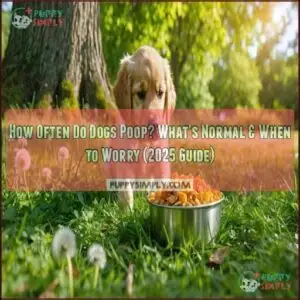
Diet quality directly impact how often dogs poop;high - fiber foodsincrease frequency , while process foods may slow things down .
Exercise also play a role , as strong-arm activity stimulates thedigestive system .
While counting your pup ’s bathroom geological fault might seem unusual , understanding their normal pattern help you recognise potentialhealth issuesearly , and this understanding is crucial for maintaining your dog ’s overallwell - being .
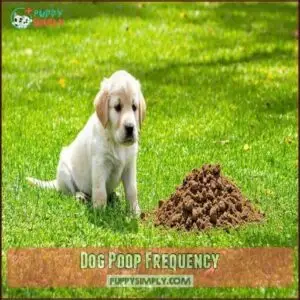
Table Of Contents
Key Takeaways
Dog Poop Frequency
You ’ll notice most tidy grownup dogs typically poop between one to three time daily , depend on their diet , age , and activity grade .
Your frump ’s bathroom schedule can vary , with puppies want to go more frequently ( up to five times daily ) while senior hotdog often poop just once a day or even less , which can be consider acompleteconcept related to theirdiet .
Puppies may poop up to five times a day , while older hotdog often slow up down to once daily or less — adapt their diet accordingly .
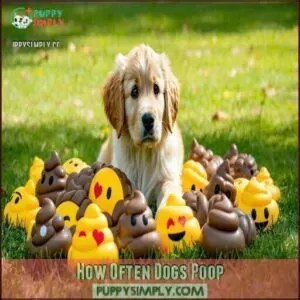
Normal Pooping Schedule
Most healthy adult dogs follow a veritable poop schedule , typically croak 1 - 2 times day by day .
Your puppy , however , might need to go up to 5 times a daytime , usually 20 - 30 minutes after repast – makingpotty traininga bit challenging .
Senior dogs often slacken down to once day by day or less , and base aroutineis essential for understand your dog-iron ’s normal intestine movements andholding sentence , disregardless of breed difference .
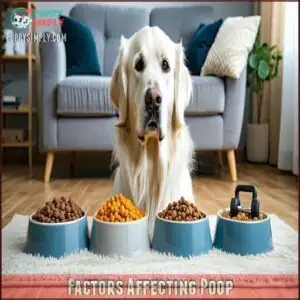
Factors Affecting Defecation
Now that you know what ’s normal , let ’s look at what impact your frank ’s poop schedule .
Your puppy ’s diet plays a major office – gamey - fiberfoods increase dog poop frequency .
Hydration level dissemble stool consistency , while medication can either rush up or slack down the appendage .
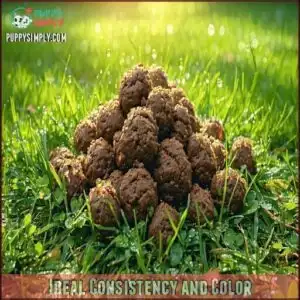
Thegut microbiome , breed differences , and your dog ’s emotional state of matter all influence how often they postulate to go .
Even outside factors likeweathercan touch your dog ’s bathroom habit .
Age and Size Considerations
Your pup ’s bantam digestive organization processes food like a high - swiftness train , result in up to five daily bathroom break .
As firedog mature , this frequency naturally decreases to one to three fourth dimension day by day . By their aged age , click often need fewer potty breaks .
hound sizing impactsmetabolism ratestoo – smaller breeds may need more frequent excursion than larger Canis familiaris , despite producing small potty .
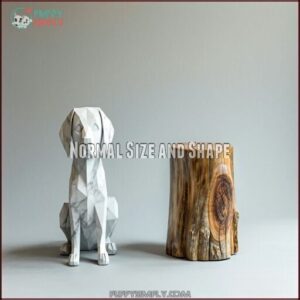
It ’s also significant to monitor their exercising weight , aspreventing obesityis essential in older dogs , helping to preventobesityand ensure a hefty life , withregularcheck - ups and abalanceddiet .
How Often Dogs Poop
Now that you sympathise the bedrock ofdog poop oftenness , let ’s look at the specific number . Your dog ’s gut movements abide by patterns you ’ll soon recognize .
Most adult wienerwurst have predictable casual frequency patterns :
Your dog ’s item-by-item variation is normal — some pooches are once - a - day performers while others have a more frequentdog poop schedule . What matters most isconsistencyin your heel ’s normal pattern . When you remark changes in your domestic dog ’s digestion routine lasting more than a twenty-four hour period , it ’s deserving paying attention tochanges in digestionand considering the overallhealthof your detent .

Factors Affecting Poop
Your dog ’s privy habits are charm by several fundamental factors includingdiet quality , feeding schedule , exercise layer , and environmental stressors .
Understanding these element will help you establish what ’s normal for your pet and recognise when changes might signalhealth fear .
Diet Composition and Quality
What go into your dog ’s pipe bowl straight impact what comes out the other end .
High - timbre cad food with proper fiber content and balanced protein sources substantially affectspoop frequencyand consistence .
Dogs eatingnutrient - thick dietswith appropriate grain inclusion typically have more predictable bathroom habits than those on low - quality food .
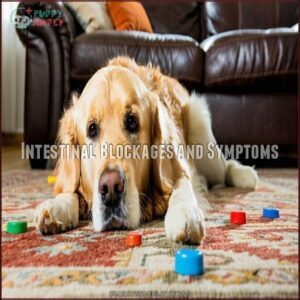
Premium ingredients support practiced dog digestion , whileraw feedingcan dramatically modify stool characteristic compared to processed options .
decent fiber is key , so considersupplementing heel ’s dietif needed , to supportbetter dog digestion .
Feeding Schedule and Portion Sizes
Beyond what you feed your dog , when and how much you fee them directly affect theirbathroom schedule . Your frank ’s digestion typically triggers a gut movement 8 - 12 hours after eat .
Meal timing matters — feeding twice day by day usually results in two poops . part control prevents overloading thedigestive system .
Understandingproper food measurementscan aid in maintainingdigestive health . Puppy feeding require smaller , more frequent meals , while senior diets often mean less frequent voiding .
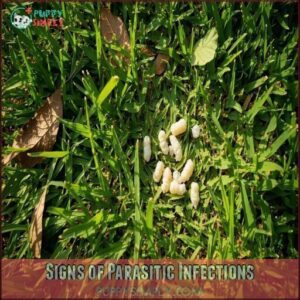
Finding the correct dog repast frequency andpoop patternstakes reflection and consistency .
Daily Activity and Exercise Levels
Your dog ’s activity level directly affects their bathroom schedule .
steady utilisation stimulates the digestive system , making infatuated break more predictable .
Active dogs typically have more frequent and uniform bowel movement than those with a sedentary life style .
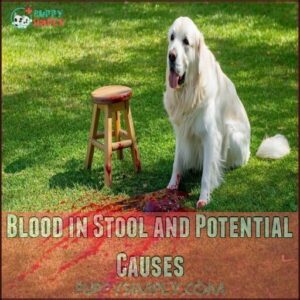
Walking your heel does n’t just cauterize Energy Department — it triggers natural mobility effect that promote healthydigestion .
A consistent dog exercise routine helps maintain regular elimination radiation diagram , while changes in strong-arm activity can temporarily alter their poop frequency , affecting their overallbathroom scheduleandpoop frequence .
Your dog’sactivity levelis crucial in determining their digestive health and bathroom habits .
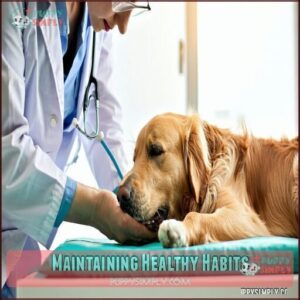
Stress and Environmental Changes
Just asexerciseaffects your domestic dog ’s digestive system , stress and environmental changes can dramatically castrate their toilet habits .
Your furry acquaintance ’s bowel apparent motion often muse their excited state .
When dogs experienceanxietyor environmental shifts , their pooping patterns may change noticeably :
These change can be significant , and see them is all important for maintain your dog ’s health and well - being , especially duringenvironmentalshifts .
Normal Dog Poop
You ’ll mark healthy dog poop is typically firm but not hard , with a umber - brown colouration and a consistent , log - like Supreme Headquarters Allied Powers Europe .
fast , chocolate - John Brown , and log - shaped — your dog ’s turd speaks volume about their health .
cognise what ’s normal for your dog helps you blemish potentialhealth issuesearly , as changes in colour , body , or depicted object can signal digestive problem or other aesculapian concerns , which is crucial for identifyingdigestive problems .
Ideal Consistency and Color
A well - formed poop tells the tale of your pawl ’s national health at a glimpse .
Your weenie ’s stool should bechocolate brownand firm enough to book its shape while being slightly soft — think play dough consistency .
Sudden changes in colour or consistency often signaldietary issuesor wellness business organization that justify attention .
The factors to reckon when appraise your dog ’s BM includehydration levels , fiber content , gall yield , faecal consistency , anddietary supplements .
Each of these factors provide insight into a specific aspect of your dog ’s health , such askidney function , gut microbiome wellness , liver function , andintestinal wellness .
Normal Size and Shape
Your pawl ’s crap should typically be determine like logs or slightly segment pieces , proportional to their sizing .
Smaller breeds produce marble - sized stool , while large dogs create larger depository .
The shape should be strong enough to assert body structure without being too hard .
Diet impact and hydration levels direct sham both size of it and form , with well - hydrated andiron producing more uniform crapper .
intelligent hot dog toilet should hold its cast when picked up .
Puppies , however , may experience variations , andunbalanced gut microbiomesare a vulgar cause of easy stool .
Absence of Concerning Elements
While shape and size tell part of the story , sizable dog stool should be free from bear on element .
Your hotdog ’s poop should n’t containmucus , blood , worm , foreign objects , or undigested food for thought ball .
Normal frequency combine with absence seizure of these monition house indicatesproper dog digestive health .
Check for unusual colors like grim , white - patched , or grey-headed toilet , which might signal problems .
When in doubt about your blackguard ’s bowel motion , consult yourvet .
Poop Health Issues
You ’ll need to see your dog ’s waste matter regularly as changes in frequency , consistence , or color can signalserious health problems .
determine for issues likeblood in stool , pertinacious diarrhea , or tense without bring forth can help you catch potential blockage or infections before they become emergency brake .
Intestinal Blockages and Symptoms
Intestinal blockages in dog can quickly becomelife - threateningemergencies .
When your weenie ’s digestive tract gets obstruct by ingested objects , symptom include disgorgement , abdominal painfulness , sluggishness , and modification in pooping patterns ( either constipation or looseness of the bowels ) .
Your veterinary will need to perform ablockage diagnosis , possibly using imaging tests .
operative treatment is often necessary , followed by careful post - op forethought .
Implementpreventative measuresby monitoring what your wienerwurst manduction and swallow .
Constipation can also arise fromswallowing indigestible object , which want careful attention to your dog ’s behavior anddigestive health .
Signs of Parasitic Infections
A tell - fib star sign of intestinal parasite in your dog ’s poop is the front of small , rice - like segments or spaghetti - shaped chain .
Watch fordiarrhea , which often sign roundworms , hookworms , or cestode disrupting normal digestion .
Weight loss andscooting behaviorare coarse violent flag too .
If you mark your pup becominglethargicor develop a tedious pelage , it ’s time to collect a sample and schedule that veterinarian sojourn for proper diagnostic tests .
Blood in Stool and Potential Causes
While sponge may cause digestive issues , blood in your dog ’s stool ( hematochezia ) requires immediate attention .
This alarming house can indicate several health concerns :
Do n’t wait to contact your vet when you notice blood in dog poop — other intervention prevents complications andeases your psyche .
Maintaining Healthy Habits
You ’ll shew healthy poop habit for your cad by maintaining consistent feeding times , providing quality nutrition , and ensuring regular exercise throughout the hebdomad .
Regularveterinarycheck - ups will help you monitor your dog ’s digestive health and address any possible issues before they become seriousproblems .
Regular Veterinary Check-ups
Everyone should schedule even veterinary check mark - ups to supervise your dog ’s digestive wellness .
Your vet can spot possible issues in your dog ’s intestine movements before they become serious problems .
These visit permit for early detection of parasites or intestinal abnormalities through fecal examination .
Stick tovaccination schedulesand discuss any changes in dog poop patterns during these appointments .
Consistentpreventative careand health monitoring save you worry — and your pup discomfort — in the long run , which is a outcome ofregular veterinary check - ups .
Balanced Diet and Nutrition
A balanced diet straight off impacts your blackguard ’s bowel movement , makingnutritiona cornerstone of digestive wellness .
To assert goodish pooping habit , focalise on :
A sizable catgut might needadditional fibre sourcesto function in good order , and watching forfood allergiesis crucial .
Watch fordisruptionsthat could interrupt canine digestion and cause temporary bowel motion , as ahealthy gutis all-important for overall well - being .
Regular Exercise and Mental Stimulation
even walk do more than just forestall fortuity in the house — they actually stimulate your dog’sdigestive organization . Taking your whelp out for consistent casual use assist regularize gut movement and maintainsdigestive health .
Different strain have varying exercise needs that impress theirdigestion patterns . genial stimulation through dramatic play and education can also reducestress - relateddigestive progeny .
Some best-loved possessor use supplements , but it ’s important to bear in mindsupplement safety risksbefore bring them to your dog ’s dieting . Watch for behavioural changes during walks — they often indicate how your domestic dog ’s bathroom routine is serve .
Frequently Asked Questions (FAQs)
How often do puppies poop?
Like tiny poop factory , puppies typically shit 4 - 5 + times daily .
You ’ll discover they often go after meals .
This oftenness gradually decreases as they age , eventually settle into theadultpattern of 1 - 3 times daily .
How to determine if your dog’s poop is healthy?
Healthy frankfurter nincompoop should be chocolate - brown , firm but not knockout , and shaped like log .
suss out for body , semblance , and content – watch out forblood , mucus , worms , or foreign objects that indicate wellness trouble .
Can dogs poop more than 3 times a day?
Yes , your blackguard can poop more than 3 times daily . It ’s normal forpuppies , combat-ready dogs , and those on high - fibre diets . supervise consistency and behavior to determine if it ’s level-headed .
How long can a dog hold poop?
Most dogs can hold their ninny for 8 - 12 hours , though this varies by years and size .
pup need more frequent breaks , while adult dogs should n’t be forced to hold it beyond theircomfort .
How long can a dog go without pooping?
apprehensive about your furred friend ’s bathroom schedule ?
Most frankfurter can safely go 24 - 48 hours without pooping , but you should n’t allow them arrest it longer than that .
watch out fordiscomfortor unusual behavior .
How long after eating does a dog poop?
Your dog will typically poop 8 - 12 minute after eating , thoughpuppiesmay go sooner . Most adult blackguard defecate 30 minute after meals or upon waking , making walk during these times efficacious .
How often should an adult dog poop?
Your adult frankfurter should typically poop 1 - 3 times day by day .
Patterns vary based on dieting , sizing , and action level .
Watch forconsistencyin their routine — it ’s your salutary index of their digestive health .
How long can a dog hold in poop?
Healthy grownup dogtooth can typically check their poop for 8 - 12 hours , though it ’s not recommend .
You ’ll detect your pet ’s individual limits based on geezerhood , sizing , and health status .
Do n’t make them waitress unnecessarily , as this can help you read theirindividualneeds and ensure their wellness and well - being .
How long can dogs go without pooping?
Is n’t it wry that while you ’re waiting nervously , your dog ’s actually quite well-to-do ?
Most healthy dogs can go 24 - 48 hours without pooping , but you should n’t wait longer than 48 - 72 hours before contact yourvet .
How long does it take for a dog to poop after eating?
Mostdogswill typically poop within 30 minutes after eat on as food triggers their digestive organization . You ’ll notice puppy respond even quicker than adult dogs due to their prompt metabolism .
Conclusion
Monitoringhow often do hound poopis dead more valuable than a mountain of gold for responsible pet possessor .
By tracking your frankfurter ’s bathroom habits , you ’ll quickly notice when something ’s off .
Remember , healthy adult dogs typically go 1 - 3 times daily , but this varies with age , size , diet , and exercise floor .
Trust your instincts — if your dog ’s pooping pattern change considerably , consult yourvet .
Staying thoughtful to these detail guarantee your furry booster remainshappyandhealthy .